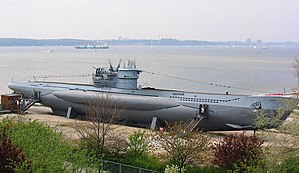German submarine U-1025
 U-995 Type VIIC/41 at the Laboe Naval Memorial. This U-boat is almost identical to U-1025.
| |
| History | |
|---|---|
| Name | U-1025 |
| Ordered | 13 June 1942 |
| Builder | Blohm & Voss, Hamburg |
| Yard number | 225 |
| Laid down | 3 June 1943 |
| Launched | 24 May 1944 |
| Commissioned | 12 April 1945 |
| Decommissioned | 30 April 1945 |
| Fate | Scuttled on 5 May 1945 |
| General characteristics | |
| Type | Type VIIC/41 submarine |
| Displacement | |
| Length |
|
| Beam |
|
| Height | 9.60 m (31 ft 6 in) |
| Draught | 4.74 m (15 ft 7 in) |
| Installed power |
|
| Propulsion |
|
| Speed |
|
| Range | |
| Test depth |
|
| Complement | 44-52 officers & ratings |
| Armament |
|
| Service record | |
| Part of: |
|
| Identification codes: | M 40 175 |
| Commanders: | |
| Operations: | None |
| Victories: | None |
German submarine U-1025 was a Type VIIC/41 U-boat of Nazi Germany's Kriegsmarine during World War II.
She was ordered on 13 June 1942, and was laid down on 3 June 1943, at Blohm & Voss, Hamburg, as yard number 225. She was launched on 24 May 1944, and commissioned under the command of Oberleutnant zur See Ewald Pick on 12 April 1945.[3]
Design
[edit]German Type VIIC/41 submarines were preceded by the heavier Type VIIC submarines. U-1025 had a displacement of 769 tonnes (757 long tons) when at the surface and 871 tonnes (857 long tons) while submerged. She had a total length of 67.10 m (220 ft 2 in), a pressure hull length of 50.50 m (165 ft 8 in), an overall beam of 6.20 m (20 ft 4 in), a height of 9.60 m (31 ft 6 in), and a draught of 4.74 m (15 ft 7 in). The submarine was powered by two Germaniawerft F46 four-stroke, six-cylinder supercharged diesel engines producing a total of 2,800 to 3,200 metric horsepower (2,060 to 2,350 kW; 2,760 to 3,160 shp) for use while surfaced, two BBC GG UB 720/8 double-acting electric motors producing a total of 750 metric horsepower (550 kW; 740 shp) for use while submerged. She had two shafts and two 1.23 m (4 ft) propellers. The boat was capable of operating at depths of up to 230 metres (750 ft).[4]
The submarine had a maximum surface speed of 17.7 knots (32.8 km/h; 20.4 mph) and a maximum submerged speed of 7.6 knots (14.1 km/h; 8.7 mph). When submerged, the boat could operate for 80 nautical miles (150 km; 92 mi) at 4 knots (7.4 km/h; 4.6 mph); when surfaced, she could travel 8,500 nautical miles (15,700 km; 9,800 mi) at 10 knots (19 km/h; 12 mph). U-1025 was fitted with five 53.3 cm (21 in) torpedo tubes (four fitted at the bow and one at the stern), fourteen torpedoes or 26 TMA or TMB Naval mines, one 8.8 cm (3.46 in) SK C/35 naval gun, (220 rounds), one 3.7 cm (1.5 in) Flak M42 and two 2 cm (0.79 in) C/30 anti-aircraft guns. The boat had a complement of between forty-four and fifty-two.[4]
Service history
[edit]On 30 September 1944, U-1025 was transferred to Flensburger Schiffbau-Gesellschaft in Flensburg to be finished. She was commissioned on 12 April 1945, but was taken out of service only 18 days later, on 30 April, because of defective batteries. She was scuttled in Flensburg Fjord on 5 May 1945, as part of Operation Regenbogen. Her wreck was raised and broken up later.[3]
See also
[edit]References
[edit]- ^ Helgason, Guðmundur. "Ewald Pick". German U-boats of WWII - uboat.net. Retrieved 24 March 2016.
- ^ Helgason, Guðmundur. "Oskar Curio". German U-boats of WWII - uboat.net. Retrieved 24 March 2016.
- ^ a b Helgason, Guðmundur. "U-1025". German U-boats of WWII - uboat.net. Retrieved 24 March 2016.
- ^ a b Gröner 1991, pp. 43–44.
Bibliography
[edit]- Busch, Rainer; Röll, Hans-Joachim (1999). German U-boat commanders of World War II : a biographical dictionary. Translated by Brooks, Geoffrey. London, Annapolis, Md: Greenhill Books, Naval Institute Press. ISBN 1-55750-186-6.
- Busch, Rainer; Röll, Hans-Joachim (1999). Deutsche U-Boot-Verluste von September 1939 bis Mai 1945 [German U-boat losses from September 1939 to May 1945]. Der U-Boot-Krieg (in German). Vol. IV. Hamburg, Berlin, Bonn: Mittler. ISBN 3-8132-0514-2.
- Gröner, Erich; Jung, Dieter; Maass, Martin (1991). German Warships 1815–1945, U-boats and Mine Warfare Vessels. Vol. 2. Translated by Thomas, Keith; Magowan, Rachel. London: Conway Maritime Press. ISBN 0-85177-593-4.
